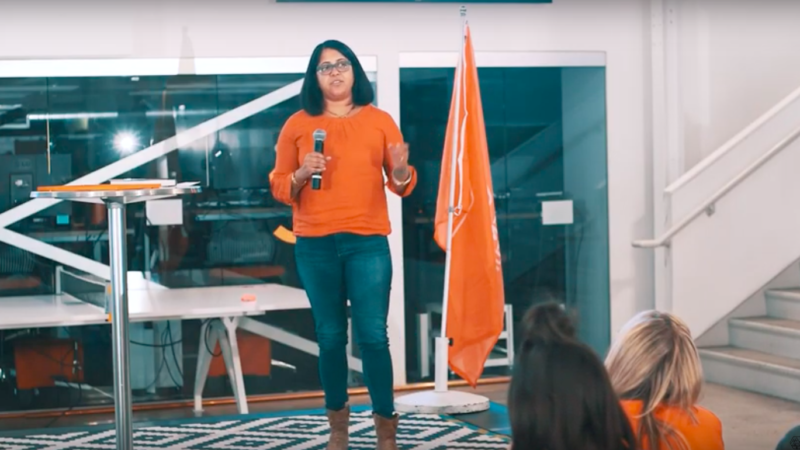Liberal White Women Are Hiring Saira Rao to Tell Them They're Racist. The Cost? $2,500 Per Dinner.
Race to Dinner has come up with an impressive con, and the marks are paying up.

Dear liberal white women: Do you enjoy pasta carbonara, getting together with friends, and learning about your complicity in racism? If so, you're in luck. Professional social justice activists Saira Rao and Regina Jackson are willing to come to your home, eat your food, and interrogate you and your gal pals to the point of tears.
And get this: The cost is a mere $2,500.
Sadly, I'm not making this up. Amazingly, white women are paying. According to a must-be-read-to-be-believed article in The Guardian, Rao and Jackson—who are Indian American and black, respectively—have already attended 15 "Race to Dinner" events in which they demand that attendees confess their racism and admit they are part of the problem.
"If you did this in a conference room, they'd leave," Rao said. "But wealthy white women have been taught never to leave the dinner table."
For someone who stylizes herself as an anti-racism activist, Rao engages in constant racial stereotyping. Her Twitter feed reads like satire in the vein of Titania McGrath, a self-aware parody account (at least from what I can recall of it before she blocked me). For Rao, everything and everyone is racist—especially white women, whom she does not like one bit. Some highlights:
— Confirmed Miscer ⚔️???????? (@ManDaveJobGood) February 2, 2020
To be absolutely clear, the Race to Dinner events do not feature actual racists. They are attended by well-meaning people who have somehow allowed themselves to become convinced that their souls are impure. Consider the testimony of one dinner host:
"I want to hire people of color. Not because I want to be … a white savior. I have explored my need for validation … I'm working through that … Yeah. Um … I'm struggling," she stutters, before finally giving up.
Another attendee, Morgan Richards, "admits she recently did nothing when someone patronizingly commended her for adopting her two black children, as though she had saved them." This is very problematic:
"What I went through to be a mother, I didn't care if they were black," [Morgan Richards] says, opening a window for Rao to challenge her: "So, you admit it is stooping low to adopt a black child?" And Richards accepts that the undertone of her statement is racist.
One more:
Erika Righter raises her tattooed forearm to her face, in despair of all of the racism she's witnessed as a social worker, then laments how a white friend always ends phone calls with "Love you long time."
"And what is your racism, Erika?" Rao interrupts, refusing to let her off the hook. The mood becomes tense. Another woman adds: "I don't know you, Erika. But you strike me as being really in your head. Everything I'm hearing is from the neck up."
Righter, a single mother, retreats before defending herself: "I haven't read all the books. I'm new to this."
Rao and Jackson have certainly come up with an interesting gimmick for their grift, though there's nothing novel about trying to convince people they are wicked and sinful—in need of a kind of absolution that only the grifter can provide (for a cost). Indeed, intersectional activism occasionally feels akin to a religion, to the extent that it emphasizes the internal brokenness of human beings and the fallen state of the world.
It's tempting, then, to observe Rao and Jackson and thus write-off the entire concept of progressive activism on race. But in truth, they are such ridiculous caricatures that probably the most appropriate response is simply to pity the gullible people whom they've swindled.


Show Comments (159)